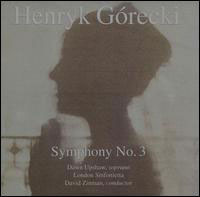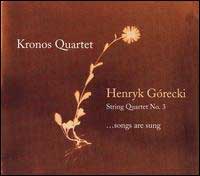The Soprano, the Sinfonietta, and the String Quartet
- Kronos Quartet: Gorecki: String Quartet No. 3... songs are sung
A decade and a half ago, music store clerks were besieged with requests for a new CD of a symphony by a Polish composer. Its texts, sung by a soprano soloist, included a 15th century poem depicting the lament of Mary, the mother of Jesus; a folk song expressing the grief of a soldier's mother; and an actual prayer written on a cell wall by a young woman detained by the Gestapo. The unifying themes are of love, sorrow, and resilient faith, each expressed in a woman's voice.
 The composer was, of course, Henryk Gorecki, and the work was Symphony No. 3, "Symphony of Sorrowful Songs." The work's transcendent beauty, as well as soprano Dawn Upshaw's moving performance, won listeners around the world, even those outside the usual audience for classical music.
The composer was, of course, Henryk Gorecki, and the work was Symphony No. 3, "Symphony of Sorrowful Songs." The work's transcendent beauty, as well as soprano Dawn Upshaw's moving performance, won listeners around the world, even those outside the usual audience for classical music.Yet to know and love the "Symphony of Sorrowful Songs" is not to comprehend Gorecki in full, though to immerse yourself in that symphony puts you in the midst of his values and philosophy. As a composer, however, he has his share of surprises.
Wandering around online in Gorecki Land led to some interesting discoveries. I did not realize, for instance, that his compositions were featured in film (Ripley's Game) and televison (Wit). And the patented Hagman smirk crossed my face when I saw he was among the composers included on The Most Relaxing Classical Album in the World... Ever! First of all, that title amounts to quite a claim, and secondly, since when does your man Henryk get tossed into a collection with Gabriel Faure and Claude Debussy?
As it happens, however, it is more than fair to label some of Gorecki's compositions as meditative, serene, tender. He has written choral works of austere beauty, charming pieces for string orchestra, and haunting, lovely passages for the soprano voice.
But prepare yourself for the varying compositional styles, for Gorecki has refused to stay put. Is he a nationalist, a minimalist, a member of the avant garde, or an inveterate borrower and blender of folk and medieval music? If the only work you happen to know is Symphony Number 3, consider his "Miserere" or "Three Pieces in the Olden Style." Submit yourself to assault by String Quartet Number 1, and then recall that the ethereal "Symphony of Sorrowful Songs" came from the same composer as the dark and dissonant Symphony No. 2 ("Copernican").
 Darkness and dissonance, as well as grief, come once again to the fore in Gorecki's most recent composition for the Kronos Quartet, String Quartet No. 3 ("...songs are sung"), which takes its title from a Khlebnikov poem about death. The music is demanding, at times possessing a gentle melancholy, then propelling itself into the dissonance of the rather unsettling Allegro, and circling back again to a dark, deliberate pace.
Darkness and dissonance, as well as grief, come once again to the fore in Gorecki's most recent composition for the Kronos Quartet, String Quartet No. 3 ("...songs are sung"), which takes its title from a Khlebnikov poem about death. The music is demanding, at times possessing a gentle melancholy, then propelling itself into the dissonance of the rather unsettling Allegro, and circling back again to a dark, deliberate pace.If Gorecki's works are informed by suffering and grief, they also chronicle courage and vision. There's an unmistakably political component alongside the music's aforementioned spirituality. Gorecki, after all, touches on some of the pivotal events of the 20th century: World War II, the rise of the Solidarity movement in Poland, Pope John Paul's return to his native land in the closing years of the Cold War.
But if Gorecki is resolutely Polish and Roman Catholic, his music transcends cultural and spiritual barriers.
I can't end this blog entry without an update on Dawn Upshaw, the versatile American soprano who provided the vocals on the "Symphony of Sorrowful Songs." I have long been dazzled by the sheer breadth of her repertoire -- everything from songs by Blitzstein and Weill to soubrette roles in Mozart -- as well as enchanted by her voice.
I was therefore saddened to learn that Ms. Upshaw had recently been diagnosed with breast cancer. However, it is a relief to report that following treatment, Ms. Upshaw is back in the concert hall and has taken up other musical projects. May she thrive and continue to share her gifts with the rest of us.




0 Comments:
Links to this post:
Create a Link
<< Home